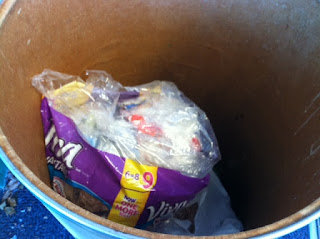My resolution for 2018 is to use less plastic. According to the
Plastic Ocean Foundation approximately 300 million tons of plastic are generated each year. In the last ten years alone companies have manufactured more plastic than in the previous century. And, according to
Common Dreams, a non-profit independent news center, investments from the fossil fuels industry for plastics production are going to increase production by an additional 40 percent over the next decade. The major problem with plastic is that it takes hundreds of years to break down, and if it ends up in waterbodies, it may never decompose. Sadly it is estimated that 8 million tons of plastic ends up in the oceans annually which causes tremendous harm to marine wildlife and ecosystems. From plastic bags, to plastic take out containers, we have become a disposable plastics society. To personally address this problem, the following are specific actions that are part of my New Year's resolution.
1. Paper or reusable bags. I own multiple reusable grocery bags that are always in my car and accompany me to the grocery store. In the past, I occasionally accepted the store plastic bags so that I could reuse them at home as trash can liners. I am going to seek alternatives.

A simple Google search reveals that there are a few compostable, bag options. A little research also revealed that these may not be a better option unless you have a municipal facility that specifically accepts them. I need to do some more research to determine what better options exist. If I'm disposing of my granddaughter's dirty diaper, I may stick with a plastic bag, but for other types of trash, a paper liner or leaving the indoor can unlined is probably the best option.
 |
| Contract your municipality before purchasing compostable bags |
I am hopeful that as more countries adopt bans on disposable plastic bags (e.g. Bangladash, Rwanda, China) manufacturers will produce more environmental friendly options. One company in India
EnviGreen is already doing this as they advertise a one hundred percent plastics free bag.
2. At the coffee shop, bring my own mug. I used to think that hot "paper" cups from coffee shops were okay since I could just rinse them and add them to the paper bin to be recycled.
 |
| This may be a better option than Styrofoam, but it still cannot be recycled |
However, I recently learned that to keep the cup from falling apart when hot, it is lined with a thin plastic coating. This means that the cup cannot be recyled, but must be put in the trash. I am going to make sure that I always have a thermos style mug in my car for those stops at the coffee shop. And an added bonus is that some stores, such as Starbucks, give you a small discount for providing your own mug.
3. Avoid single use containers when possible. I love having a yogurt every day and single use containers are convenient. I have previously featured Yoplait's Oui yogurt because it is made in a glass container. This is a great option to avoid plastic, although at over double the price of most single use containers, it is a costly option.
Another choice which does not eliminate plastic, but reduces it, is to purchase the 32 oz. size containers and then pack individual servings in reusable glass containers at home.
4. Limit use of small plastic sandwich bags. When I am not reheating leftovers for lunch, I am packing bread and typically use fold over plastic bags. I recently purchased some reusable sandwich bags and will be trying these out instead.
 |
| These bags can be rinsed or placed in the dishwasher to clean |
A small company called
Bee's Wrap out of Vermont, makes food wraps out of organic cotton, beeswax, organic jojoba oil, and tree resin. These are truly an environmentally safe alternative and is local to boot!
In today's world it is impossible to eliminate plastic entirely from our lives, but with these few steps I will not only feel better about myself, but I will have contributed, albeit in a small way, to the reduction of this pervasive pollutant. If you are interested in joining an international movement to combat plastic pollution sign up at
https://www.breakfreefromplastic.org/.
January 15, 2018 Update: Over the past week I kept track of plastic use I eliminated just by making a little extra effort - such as remembering to bring my thermos mug into the coffee shop, to use the reusable sandwich wraps, and to not accept a plastic bag at any store, not just the grocery store. It totaled 3 styrofoam or plastic cups; 4 sandwich bags and 6 store bags. It may not seem like much, but over the course of a year, it all adds up.
Also, in the news this month was a story on an innovative plastics recovery program in Boise, Idaho which will convert lower grade plastics to diesel fuel. The city is embarking on this effort utilizing a grant from Dow Chemical Co. and administered by Keep America Beautiful. It is going to allow residents to set aside for pick-up lighter weight plastics, such as foam cartons, plastic bags and candy wrappers, which are not allowed under their current mixed-waste recycling program. These materials will be bagged separately, then delivered to a plant in Salt Lake City where they will be converted to fuel. If the program is successful, it is hoped that other cities will jump on board.









